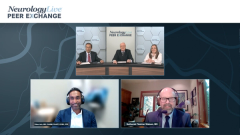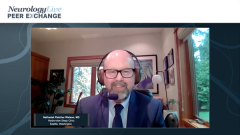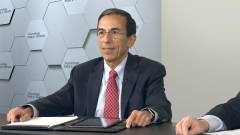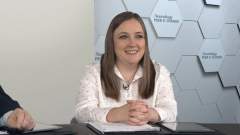
Managing Insomnia: Practical Advice for Community Physicians
Closing their discussion on insomnia, panelists share final thoughts and advice for community physicians.
Episodes in this series

Transcript:
Michael J. Thorpy, MD: We’re coming to a close. Let’s talk about what sort of advice you might give to physicians, treating physicians. For the physicians out there, are there particular pieces of information that you really feel they ought to know when it comes to the diagnosis and management of insomnia? Erinn?
Erinn E. Beagin, MD: I think one of the biggest pieces of information is to ask, and for the general internist to not be afraid to ask about it, and not to be afraid to address it. I think that is a big thing in primary care. A lot of these medications are controlled, and so therefore, primary care physicians might be resistant to address it, and then have to start writing [prescriptions] for them. I think the biggest thing is to ask, and to realize that it is impacting the entire patient, their health, psychosocial aspects, everything. You may be missing the mark on a lot of your other goals of health care if you’re not addressing their insomnia and what’s going on. I think that would be one thing to do. The other thing would be to keep abreast of these newer agents that are coming up. Try to find a sleep medicine doctor in your area or at one of your local health care facilities or teaching hospitals who you can tap into. You may not be able to get all of your insomniacs to see a specialist like you are, but to be able to say, “OK, I tried this, this is what’s going on, what would my next step be?” I think the biggest thing that I would recommend to physicians is don’t be afraid of it. I think for many years, we’ve kind of been, “I don’t know, I don’t want to go there.” It isn’t something for which there are enough sleep doctors for us to refer everybody to.
Michael J. Thorpy, MD: Karl, what do you find are the most important things that you want physicians to know about the diagnosis and management of insomnia? Are there certain take-home points that you would like them to hear about?
Karl Doghramji, MD: I agree with Erinn, No. 1, don’t be afraid to ask. No. 2, once you do ask, develop a systematic approach to evaluate the problem, like you would with hypertension, with high blood sugar levels, step 1, step 2, step 3, do a differential diagnosis. What are the inventories you’d like to use? What are some of the tests? When would you refer? We already spoke about some of these, but you may want to develop a systematic method to address these in your office. And No. 3, how would you treat the problem, developing a strategy to do that? Which hypnotic for what disorder? And No. 4, when do you refer? I think as sleep specialists, we of course see a lot of referrals for insomnia. And I would say don’t be afraid to refer to the specialists. We have a lot we can do in terms of diagnostic approaches to be able to help your patients.
Michael J. Thorpy, MD: I think it is very sound advice. Insomnia is such a common problem for all physicians, and they see it all the time. But there are a lot of things that they certainly can do. Taking a good history is most important for a start, working out what the associated factors are, whether comorbid conditions are worsening it. If there are underlying psychiatric conditions, which are really common, then treating those at the same time as treating the insomnia is essential. I think physicians tend to think, “Well, if the patient’s primary medical or psychiatric problem goes away, then the insomnia is going to go away as well.” But that’s not the case in most cases.
You do need to treat the insomnia. Consider the behavioral treatments we’ve talked about. I personally, as I mentioned, believe that controlling the timing of sleep within 24 hours is the most essential point. Thus, having the person go to bed at the same time, get up at the same time, and be in bed for an appropriate amount of time, which as I mentioned is no more than 8 hours, I think is essential for anyone with insomnia. Avoiding those daytime naps as well. And then, if you can have access, as you said, to cognitive behavioral therapists and be able to get them that specific treatment, that’s good. But most physicians are not going to have access to that. But there are things that they can do in the office, as we’ve talked about, concerning dealing with sleep restriction, about stimulus control, having them only go to bed when they’re sleepy, and then get up at the same time in the morning. Deal with some of those misunderstandings about sleep, for example, the patient who feels that the end of his life is really occurring because he’s got insomnia, but trying to tell the patient that there is help, that they can improve and that they don’t necessarily need to let this affect their life. And take a positive attitude, remove those negative sort of connotations with sleep, turn it into something more positive that they can do and that they’re going to make headway. Then consider, as we’ve mentioned, the newer medications, and it’s exciting that there are new drugs becoming available in the future. Particularly, that there are new mechanisms of action, I think that’s particularly exciting. Thus, there’s a lot that a physician can do.
I think we’ll bring this program to a close. I’d like to thank Karl, Erinn, Nathaniel, and Vikas, for their involvement with this discussion on insomnia. I think it has been very useful. I’ve certainly learned a lot from you all. I hope our audience has also picked up a lot of useful information. Once again, thank you very much for this very comprehensive and informative discussion.
Transcript edited for clarity.
Newsletter
Keep your finger on the pulse of neurology—subscribe to NeurologyLive for expert interviews, new data, and breakthrough treatment updates.














